|
|
|
Sort Order |
|
|
|
Items / Page
|
|
|
|
|
|
|
| Srl | Item |
| 1 |
ID:
134789
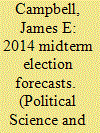

|
|
|
|
|
| Summary/Abstract |
In about two months, more than 90 million Americans (roughly 40% of those eligible to vote) will elect 435 members of the US House of Representatives and 36 members of the US Senate. The results of this midterm election will go a long way in determining the direction and extent of political change during the next two years. At present, like the nation itself, Congress is divided. Democrats hold a majority in the Senate, Republicans a majority in the House. To take control of the House, Democrats must gain 17 seats beyond the 201 they won in 2012 or 19 more than their current 199 seats (with three vacancies). Republicans must pick up six seats to regain their Senate majority. The Senate’s current party division is 53 Democrats and 45 Republicans. The two independents who caucus with the Democrats and the vice presidential tie-breaker put the Republicans’ magic number at six.
|
|
|
|
|
|
|
|
|
|
|
|
|
|
|
|
| 2 |
ID:
134801


|
|
|
|
|
| Summary/Abstract |
Scholars often rely on student samples from their own campuses to study political behavior, but some studies require larger and more diverse samples than any single campus can provide. In our case, we wanted to study the real-time effects of presidential debates on individual-level attitudes, and we sought a large sample with diversity across covariates such as ideology and race. To address this challenge, we recruited college students across the country through a process we call “colleague crowdsourcing.” As an incentive for colleagues to encourage their students to participate, we offered teaching resources and next-day data summaries. Crowdsourcing provided data from a larger and more diverse sample than would be possible using a standard, single-campus subject pool. Furthermore, this approach provided classroom resources for faculty and opportunities for active learning. We present colleague crowdsourcing as a possible model for future research and offer suggestions for application in varying contexts.
|
|
|
|
|
|
|
|
|
|
|
|
|
|
|
|
| 3 |
ID:
134793
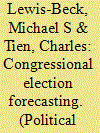

|
|
|
|
|
| Summary/Abstract |
In the United States, election forecasting has expanded from First Generation to Second Generation approaches. 1 The First Generation took hold in the early 1980s, and was dominated by a battle between structural modelers and pollsters (and to a lesser extent, the markets). The Second Generation, which had sunk deep roots by the 2012 presidential election, was dominated by Structuralists, Aggregators, Synthesizers, and Experts (as labeled by Lewis-Beck and Stegmaier 2014). The Structuralists continued in the tradition of issuing forecasts from static, single-equation explanatory models (e.g., Abramowitz 2014, Campbell 2014). The Aggregators departed from reliance on the polls of individual leading houses, instead freely combining many polls to come up with averaged, and dynamic, forecasts (e.g., Real Clear Politics). The Synthesizers joined structural models and poll aggregates to provide changing forecasts as Election Day approached (e.g., Erikson and Wlezien 2014; Linzer 2014). In contrast to this, The Experts, or Judges looked at whatever information they considered relevant, quantitative or not, arriving at forecasts shaped by current data and intuition (e.g., Cook and Wasserman 2014; Rothenberg 2014).
|
|
|
|
|
|
|
|
|
|
|
|
|
|
|
|
| 4 |
ID:
134800


|
|
|
|
|
| Summary/Abstract |
Advocates for same-sex marriage have had much to celebrate. The last few years have shown that state after state and senator after senator have declared their support for full marriage equality. Such momentum suggests that their goals will be realized sooner rather than later. In this article, we analyze when senators announce their support for same-sex marriage. Contrary to the popularly held belief that their decisions will quickly snowball into filibuster-proof numbers, we find that most of the easy successes have already been achieved. The difficulty of securing the last few votes may take much longer.
|
|
|
|
|
|
|
|
|
|
|
|
|
|
|
|
| 5 |
ID:
134794
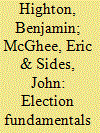

|
|
|
|
|
| Summary/Abstract |
Our congressional forecasting model provides predictions of individual House and Senate races as well as aggregate party seat shares in each chamber. It does so by marrying an underlying structural or “fundamentals”-based model with available polling data—an approach similar to Linzer (2013).
The structural portion of the model is based on contested House and Senate elections from 1980 to 2012, excluding those when an independent or third-party candidate won a significant share of the vote. 1 The dependent variable is the Democratic candidate’s share of the major-party vote. The independent variables are drawn from the extensive literature that has identified significant national and state or district correlates of congressional election outcomes (e.g., Jacobson 2012). These include:
|
|
|
|
|
|
|
|
|
|
|
|
|
|
|
|
| 6 |
ID:
134790


|
|
|
|
|
| Summary/Abstract |
This article presents forecasts of national seat swing in the 2014 House and Senate elections based on relatively simple models that incorporate the results of the generic ballot question. The generic ballot question, which has been asked by the Gallup Poll since 1946 and by many other national polls in recent years, provides a way of assessing the mood of the American public in the months leading up to a national election. This question asks a national sample of American voters whether they prefer a Democrat or a Republican for the House of Representatives without providing the names of the candidates.
|
|
|
|
|
|
|
|
|
|
|
|
|
|
|
|
| 7 |
ID:
134797


|
|
|
|
|
| Summary/Abstract |
Much ink has been spilled to describe the emergence and likely influence of the Tea Party on the American political landscape. Pundits and journalists declared that the emergence of the Tea Party movement pushed the Republican Party to a more extreme ideological position, which is generally anti-Washington. To test this hypothesis, we analyzed the ideological positions taken by candidates in the 2008 and 2012 pre-Iowa caucus Republican presidential-primary debates. To establish the positions, we used the debate transcripts and a text-analytic technique that placed the candidates on a single dimension. Findings show that, overall, the 2012 candidates moved closer to an anti-Washington ideology—associated with the Tea Party movement—and away from the more traditional social conservative Republican ideology, which was more salient in the 2008 debates. Both Mitt Romney and Ron Paul, the two candidates who ran in both elections, shifted significantly in the ideological direction associated with the Tea Party.
|
|
|
|
|
|
|
|
|
|
|
|
|
|
|
|
| 8 |
ID:
134807


|
|
|
|
|
| Summary/Abstract |
Internship placements located away from capital cities and metropolitan areas may lack opportunities for involvement in high-profile issues but they can uphold standards of “high-impact educational practice” (Kuh 2008). This study of 59 political science interns at the Mississippi University for Women demonstrates that high-impact outcomes may be generated in small-city placements that include administrative tasks if students are encouraged to reflect on their experiences and recommend improvements. Students not only extract information from their experiences for academic assignments, they also appraise the effectiveness of the work unit in attaining its goals and they formulate means by which it may improve procedures and outcomes. The scale of operations in small-city environments broadens the options for this type of analysis: exposure to a wide scope of decision processes and results is preferred to a focus on a specialized task.
|
|
|
|
|
|
|
|
|
|
|
|
|
|
|
|
| 9 |
ID:
134803
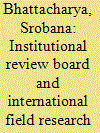

|
|
|
|
|
| Summary/Abstract |
Research on political conflict can benefit immensely from fieldwork. However, the Institutional Review Board (IRB) process is elaborate and daunting that discourages rather than encourages this type of research. Existing policies often are insensitive to the many uncertainties related to field research abroad, especially in conflict zones. Three reasons for this are identified in this article. First, the federal regulations to protect human subjects of social science research are most suitable for biomedical sciences. Second, there is huge gap between “procedural ethics” and “ethics in practice.” Third, there is a lack of communication or dialogue between researchers and IRBs. After discussing these reasons, I offer the following suggestions: bridging the gap between the researcher and the IRB; reducing delays in the IRB approval and revision process; encouraging collaboration and dialogue among researchers; and advocating a proactive stance by academic associations.
|
|
|
|
|
|
|
|
|
|
|
|
|
|
|
|
| 10 |
ID:
134810


|
|
|
|
|
| Summary/Abstract |
Federalism is a core principle of American government; yet, how much attention is given to federalism beyond introductory courses? A 1969 study described American federalism as the “dark continent” of political science teaching. Based on surveys of chairs of US departments of political science and members of the APSA’s section on federalism and intergovernmental relations in 2013, the authors found that these course offerings have increased markedly since 1969, that the courses cover a range of topics, and that many department chairs are interested in offering these courses in the future. However, the teaching of comparative federalism lags far behind American federalism. Thus, comparative federalism remains a “dark continent” of federalism teaching.
|
|
|
|
|
|
|
|
|
|
|
|
|
|
|
|
| 11 |
ID:
134806


|
|
|
|
|
| Summary/Abstract |
The use and efficacy of problem-based learning (PBL) exercises during single class periods, especially in political science courses, have largely been unstudied. This article explores the ability of a PBL exercise to provide better learning outcomes than a standard lecture-discussion presentation on a particular topic in an introductory political science course. The author finds that the PBL approach, as a one-time pedagogical exercise, is not more effective at producing learning. In exploring the data, however, the author finds that differences in course structure and methods of learning assessment can have a larger impact on learning outcomes than specific teaching techniques.
|
|
|
|
|
|
|
|
|
|
|
|
|
|
|
|
| 12 |
ID:
134795
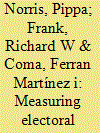

|
|
|
|
|
| Summary/Abstract |
Many contentious elections end in disputes about alleged fraud, irregularities, and malpractices. How do we know when these claims are valid and when they are false complaints from sore losers? This article describes a new dataset developed by the Electoral Integrity Project. Based on a survey of election experts, the research provides new evidence to compare how national contests around the world are meeting international standards of electoral integrity. The questionnaire includes 49 key indicators clustered into 11 stages of the electoral cycle, as well as generating an overall summary Perception of Electoral Integrity (PEI) 100-point index. The evidence displays high levels of external validity, internal validity, and legitimacy. The PEI datasets allow researchers to gauge the perceived quality of elections worldwide. This study summarizes the PEI’s research design, compares the quality of elections around the globe, and illustrates how electoral integrity is linked with both democracy and development.
|
|
|
|
|
|
|
|
|
|
|
|
|
|
|
|
| 13 |
ID:
134791


|
|
|
|
|
| Summary/Abstract |
This article presents a forecast of the 2014 midterm House election based on information available four to six months in advance. The approach builds on our forecasts of the 2006 (Bafumi, Erikson, and Wlezien 2008) and 2010 (Bafumi, Erikson, and Wlezien 2010a,b) midterm elections. 1 We incorporate information about the national forces at work in the election, which are evident early in the election year from generic congressional polls plus the party of the president. We also incorporate information about the districts themselves, which is reflected in their partisan predispositions and in other ways, most notably, whether the incumbent seeks reelection. To forecast the 2014 election, we simulate the national vote and district outcomes using the past as our laboratory, details about which we provide in the text that follows.
|
|
|
|
|
|
|
|
|
|
|
|
|
|
|
|
| 14 |
ID:
134804


|
|
|
|
|
| Summary/Abstract |
Given the extraordinarily competitive academic job market in the United States, this article explores a relatively new prospect for American-trained political science PhD graduates: teaching at a foreign institution. The article proceeds in two parts. First, it discusses various benefits and challenges associated with working abroad. Second, it provides practical guidance for candidates considering the international job market.
|
|
|
|
|
|
|
|
|
|
|
|
|
|
|
|
| 15 |
ID:
134798


|
|
|
|
|
| Summary/Abstract |
This article provides evidence for bias in the polling of American political candidates who are accused of personal or financial scandal, wherein the support of the accused candidate is understated. Evidence for this phenomenon is found in the analysis of a dataset of district-level polls of US House elections during the 2002–2012 election cycles. This bias helps to explain several unanticipated outcomes in recent American legislative elections, in which scandal-tarred incumbents unexpectedly were reelected or defeated by surprisingly narrow margins. The article also finds evidence of a smaller bias, previously observed by practitioners, wherein support is overstated for incumbents who are not accused of scandal.
|
|
|
|
|
|
|
|
|
|
|
|
|
|
|
|
| 16 |
ID:
134808


|
|
|
|
|
| Summary/Abstract |
Political satire has become increasingly prominent in recent years, leading some political science instructors to use satire in their courses. Yet, recent work suggests that political satire may encourage cynicism and decrease political efficacy. In this article, the author develops and tests an approach to teaching effectively with satire. Frequent use, source diversity, and critical evaluation engage students while allaying satire’s potential detrimental effects. The author evaluates this pedagogical approach through a classroom experiment using both in-person and online classes (student N = 163). Qualitative and quantitative data offer suggestive evidence that refutes the warning that satire fundamentally depresses political efficacy and indicates that students enjoy satire and endorse its use. By deliberately using diverse satirical sources, instructors can maximize the benefits of satire while minimizing potential drawbacks. For interested instructors, the author’s website contains a searchable catalog of satirical articles, video clips, and cartoons that can be used to teach specific political science concepts.
|
|
|
|
|
|
|
|
|
|
|
|
|
|
|
|
| 17 |
ID:
134802


|
|
|
|
|
| Summary/Abstract |
Political science is falling behind a broad movement in the United States that seeks to reform the teaching of scientific literacy in undergraduate education. Indeed, political science is far behind that movement because the discipline does not have a collective commitment to science education at the undergraduate level. This article discusses prominent efforts in this reform movement and assesses the state of science education in our discipline. The authors propose an agenda for action on this issue in political science as well as fundamental educational benchmarks for undergraduate political science literacy.
|
|
|
|
|
|
|
|
|
|
|
|
|
|
|
|
| 18 |
ID:
134792
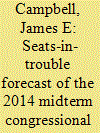

|
|
|
|
|
| Summary/Abstract |
One of the most commonly referenced generalizations about congressional elections is attributed to Speaker of the House Thomas P. “Tip” O’Neill. According to the venerable Speaker, “All politics is local.” Of course, in the broad sense, this is far from the case. A vast body of research and evidence indicates that national political conditions greatly shape congressional vote decisions and election outcomes. 1 But in a strict sense, it and its companion generalization— all politics is short-term— are difficult to argue with. At least formally, elections are decided by the actions of individual voters expressed at the ballot box on Election Day (or thereabouts). To be of consequence, national and long-term considerations must influence the political decisions made in the here and now—local and current.
|
|
|
|
|
|
|
|
|
|
|
|
|
|
|
|
| 19 |
ID:
134805


|
|
|
|
|
| Summary/Abstract |
Nine secondary teachers who were taught to use one model of deliberation, Structured Academic Controversy (SAC) (Johnson and Johnson 1979), were matched with nine teachers in their schools who taught similar grade levels and subjects. Teachers in the Deliberation Classes engaged students in three deliberations across six months. Deliberations focused on current public issues, such as whether violent juvenile offenders should be tried as adults. Five of the nine classroom pairs were analyzed using both pre- and post-questionnaires. There were no statistically significant differences in the pre- and post-questionnaire responses of students in the Deliberation Classes (n = 244) and Comparison Classes (n = 249) in terms of self-reported issue knowledge. Variance in student opinion in the Deliberation Classes showed a significant decrease. Students in the Deliberation Classes (n = 297) demonstrated greater perspective-taking abilities than students in the Comparison Classes (n = 238). Within classes, diversity of opinion regarding issues was evident.
|
|
|
|
|
|
|
|
|
|
|
|
|
|
|
|
| 20 |
ID:
134796


|
|
|
|
|
| Summary/Abstract |
This article examines Tea Party candidates for the US House of Representative in 2012. Tea Party and Tea Party–endorsed candidates are similar to other Republican candidates. Although they have served in the House for a shorter period, they have approximately the same financial resources, prior political experience, and reelection rate as other Republicans. Multivariate analysis finds that Tea Party membership and endorsement have no impact on electoral outcome when other political factors are controlled for (e.g., incumbency, running for an open seat, quality of opposing candidate, prior political experience, financial resources, and Obama’s vote). Consequently, the success of Tea Party candidates depends on acquiring the traditional political resources, having weak opponents, and running in favorably disposed constituencies rather than identification with this highly visible political movement.
|
|
|
|
|
|
|
|
|
|
|
|
|
|
|
|
|
|
|
|
|